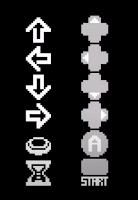Fifty Days of UFO 50: Day 22
If I'm going to write about my experience starting Grimstone, I should probably explain why I'll be referring to it as a "Narrative Party Role Playing Game," (or NaPa RPG) and not a "Japanese Role Playing Game," (or JRPG). The whole impetus to come up with something like that and stick to it for as long as I have is certainly worthy of its own standalone article down the road, but for now...
In video game circles, when we say "JRPG" these days, we don't really intend the "J" to stand for "Japanese" most of the time. Except when we do! It bears thinking about, because while these subgenre descriptors are useful for talking about the medium, they're usually design coded, not culturally coded.
Long story short, way back around 2016 I read an interview with a Japanese developer describing why the term "JRPG" didn't makes sense from their perspective and felt a little hurtful and limiting (it may have been Naoki Yoshida back then as well, because the discourse surrounding his recent interviews on the subject are preventing me from finding things before 2023.) It really struck a chord at the time, and people in my immediate social circles have had to deal with my wholesale replacement of the term for many years.
Why replacement as opposed to elimination? As stated, subgenre descriptors are very useful; without them, a simple discussion about design conventions balloons into a corpus of qualifying statements and explanations. Cringeworthy as "metroidvania" may be, people know exactly what it means, which is impressive given there's almost as many structural ideas jampacked in there as the term has syllables.
Underestimate the power of densely encoded information at your peril!
Nintendo, understandably not wanting to market recent Metroid releases as "Themselves-mixed-with-some-Konami-IP," has started referring to the genre as "Search Action;" replacement, not removal.
Back when the industry was more segregated by distance and communication, Eastern and Western developers took the same tabletop role playing inspirations in different directions.
Here in the West, the core player fantasy was centered on the player having the computer act like a game master, hence the focus on rolling your own Player Character and pseudo-freely charting your own course through what we sometimes call "Computer Role Playing Games" like Ultima and Baldur's Gate.
In the East, the focus was shifted a little bit to half-resemble the Game Master's perspective, not in terms of authoring the story but experientially; games like Dragon Quest and Final Fantasy are less like sitting down at the TTRPG table as a PC, and more like one GM interactively regaling another with the epic Narrative of how their favorite Party of adventurers saved the world.
Imperfect as my invented designation may be, the intent was to reference that stylistic design difference in a somewhat Japanese-feeling fashion, smashing "Narrative Party" down to "NaPa" in much the same way as "Pocket Monsters" became "PokeMon" for short!
Yes, it's one syllable longer than "JRPG" and if you live anywhere neat California it might make you think of wine country, but I like the think that our fellow developers across the Pacific would appreciate it anyway.
[You're not actually here to sell the term's qualities; you're going to continue using it even if people tell you it's awful and will never, ever catch on.]
"Almost two years in the making, this massive game was actually started before its thematic cousin Rail Heist."
So they put a whole wild west themed NaPa RPG up in this thing, which is pretty impressive!
I wasn't fully prepared for some of the harsh conventions it's adopting from games of the era:
- Choose and name 4 character classes out of 8 sight unseen
- No duplicates, but also very few clues about their relative strengths and weaknesses
- I hope Grimstone is tuned such that any party composition feels viable, because you'd better believe I simply drafted all four female-coded characters, (even though the dog was extremely tempting)
- Want to know what a new ability or consumable item does? Make an educated guess based on the name and use it.
- Descriptions would ruin the potential surprise!
- You're extremely weak to start, and there's nothing stopping you from trekking to where encounters will two-shot you
- There's real value in just orbiting the first couple of locations for a while, building up enough Teeth to fully kit yourself out
- Did I mention the money you earn by killing enemies is Teeth? Feels like I'm in the "High Noon Gothic" League of Legends skinline or something...
- More like GRINDstone, amirite? Heyo, whoa Nellie!
- Does being closer to the top of the order make you more likely to be attacked? You're granted the ability to swap them around, so maybe?
- Just fight dozens of battles and see if you can get a feel for the distribution!
- Humans are inherently good as statistics and probability, right?
It's still very funny to me that this is essentially a constant swing timer check, technically making Grimstone... yet another golf game!






Comments
Post a Comment